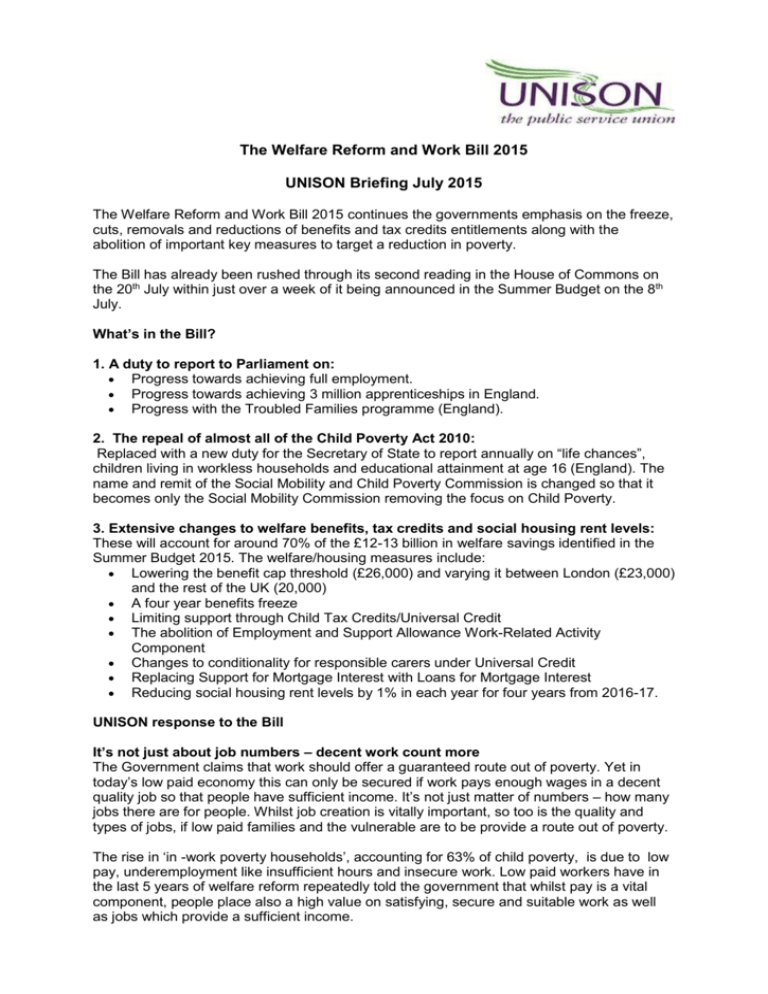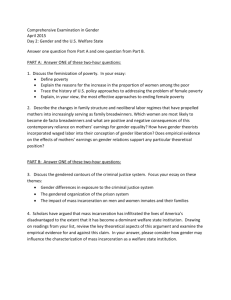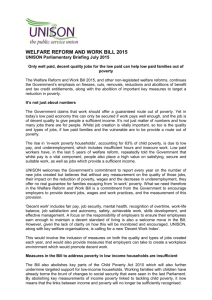welfare reform and work bill 2015 final
advertisement

The Welfare Reform and Work Bill 2015 UNISON Briefing July 2015 The Welfare Reform and Work Bill 2015 continues the governments emphasis on the freeze, cuts, removals and reductions of benefits and tax credits entitlements along with the abolition of important key measures to target a reduction in poverty. The Bill has already been rushed through its second reading in the House of Commons on the 20th July within just over a week of it being announced in the Summer Budget on the 8th July. What’s in the Bill? 1. A duty to report to Parliament on: Progress towards achieving full employment. Progress towards achieving 3 million apprenticeships in England. Progress with the Troubled Families programme (England). 2. The repeal of almost all of the Child Poverty Act 2010: Replaced with a new duty for the Secretary of State to report annually on “life chances”, children living in workless households and educational attainment at age 16 (England). The name and remit of the Social Mobility and Child Poverty Commission is changed so that it becomes only the Social Mobility Commission removing the focus on Child Poverty. 3. Extensive changes to welfare benefits, tax credits and social housing rent levels: These will account for around 70% of the £12-13 billion in welfare savings identified in the Summer Budget 2015. The welfare/housing measures include: Lowering the benefit cap threshold (£26,000) and varying it between London (£23,000) and the rest of the UK (20,000) A four year benefits freeze Limiting support through Child Tax Credits/Universal Credit The abolition of Employment and Support Allowance Work-Related Activity Component Changes to conditionality for responsible carers under Universal Credit Replacing Support for Mortgage Interest with Loans for Mortgage Interest Reducing social housing rent levels by 1% in each year for four years from 2016-17. UNISON response to the Bill It’s not just about job numbers – decent work count more The Government claims that work should offer a guaranteed route out of poverty. Yet in today’s low paid economy this can only be secured if work pays enough wages in a decent quality job so that people have sufficient income. It’s not just matter of numbers – how many jobs there are for people. Whilst job creation is vitally important, so too is the quality and types of jobs, if low paid families and the vulnerable are to be provide a route out of poverty. The rise in ‘in -work poverty households’, accounting for 63% of child poverty, is due to low pay, underemployment like insufficient hours and insecure work. Low paid workers have in the last 5 years of welfare reform repeatedly told the government that whilst pay is a vital component, people place also a high value on satisfying, secure and suitable work as well as jobs which provide a sufficient income. UNISON welcomes the Government’s commitment to report every year on the number of new jobs created but believes that without any measurement on the quality of those jobs, their impact on the reduction of poverty wages or decrease in underemployment, they offer no real guarantee for families escaping from ‘in-work’ poverty. What we need therefore in the Bill is a commitment from the Government to encourage employers to provide decent jobs, wages and work practices and this provision should be measured. 'Decent work' includes fair pay, job security, mental health, recognition of overtime, work-life balance, job satisfaction and autonomy, safety, achievable work, skills development, and effective management. A focus on the responsibility of employers to ensure their employees earn sufficient for a decent life is also a welcome move in the Bill but again how will it be monitored and encouraged? UNISON, along with key welfare organisations are calling for a new ‘Decent Work Index’. This would involve the inclusion of measures on both the quality and types of jobs created each year and also provide measures that employers can take to create a workplace environment which would promote decent work. Measures in the Bill to address poverty in low income households are insufficient The Bill also abolishes key parts of the Child Poverty Act 2010 which will also further undermine targeted support for low income households. Working families with children have already borne the brunt of changes to social security that were seen in the last Parliament. By abolishing key measurements of income poverty linked to tackling child poverty, it now means that the links between income and poverty will no longer be sufficiently recognised. Increasing wages and reducing benefits - counting the winners The Institute for Fiscal Studies (IFS) has produced an analysis of the impacts of the announcements on benefits from the Summer Budget. They have found that: 2.7 million people (OBR estimate) who earn below £9.35 per hour in 2020 would see some form of hourly pay increase. Most of these people are likely to be working part-time and likely to be female The “National Living Wage” is likely to be £9.35 in 2020 (OBR) which means that for those people working 35 hours a week currently on the NMW and over 25 years old, they will see an overall increase of just over £5,000 a year, before tax. However, the IFS has found that a combination of the various social security reductions will cost households approximately £5,500 a year cancelling out any increases in income through increasing low wages Work allowances are being reduced to £3,850 from £6,420. Universal Credit will be withdrawn immediately for non-disabled childless households. 3 million families will lose around £1000 a year and it will potentially weaken work incentives Freezing benefits for four years will reduce income by £260 a year for a family on average and by £280 a year for those in work (13 million people in total, 7.4 million of which are working) Abolishing the family element of child tax credit will affect 4 million families who will lose £545 a year Removing child tax credit entitlements for third and subsequent children will reduce income by £3,670 for 872,000 families (548,000 in work) The Chair of the Work and Pensions Select Committee, Frank Field MP commissioned the House of Common library to analyse the impact of the cut in the amount people are allowed to earn before they start losing tax credits, and the increased, 48% taper rate (the amount claimants lose for every extra pound they earn).The analysis shows that: 3.2 million people will lose an average of £1,350 next year 754,900 families earning between £10,000 and £20,000 a year will lose up to £2,184 next year Families earning £10,226 will be exactly £1,500 worse off 51,600 families earning between £20,000 and £30,000 will be made worse off by up to £2,884 next year 580,100 of Britain’s poorest working families earning less than £6,420 a year face the prospect of being ‘taxed’ for the first time. Those earning between £3,850 and £6,420 will lose 48p in tax credits for each pound they earn. This is a higher withdrawal of income than that imposed on the country’s highest earners. Families earning £6,410 a year will be £1,200 worse off as a result. Women will be the overall losers The gendered impact of the new Bill is negative in terms of reduction of child benefit after two children, and the reduction of the family allowance, which is paid to the primary carer, usually the mother The negative gender impact is compounded by the other proposed reductions in earnings disregards, which will have the effect of reducing work incentives, especially for second earners, again who tend to be women The Women’s Budget Group have found in their gender analysis of the budget that women are overall losers in the Summer Budget Overall, if they aren’t already in work, women are likely to be negatively impacted by the cuts to social security because the net loss is greater, and there is less incentive to move into work with the changes UNISON believes that the Bill overall represents a backwards step in terms of poverty eradication in the UK. It will reduce people’s income so much that achieving a Minimum Income Standard for the poorest will no longer be achievable in the UK. The need for food banks and personal debt is certain to rise in the poorest households. Women will face more financial barriers affecting their ability to lift themselves and their families out of poverty. What you can do Write to your MP https://www.writetothem.com/ and ask them to (i) Support UNISONs key recommendations to go in the Welfare Reform and Work Bill: That measurements for the quality of jobs and a ‘Decent Work Index’ are developed and included in the Bill alongside total numbers of jobs; The Child Poverty Act be retained. Specifically, its name and the requirements on Local Authorities to have regard for it and the current measurements of poverty; That these measurements are supplemented to address low pay and poverty by developing a poverty strategy, making a commitment to provide more affordable social housing, and addressing UK economic inequality; That any changes to welfare reforms are considered for their potential negative impact on work incentives, particularly the abolition of Employment and Support Allowance Work-Related Activity Component for people with disabilities; An impact assessment on the cumulative impacts of the proposed reforms on different types of people, for example young people, people with disabilities, families with children, lone parents and older people; A gender analysis and impact assessment of welfare reforms be undertaken before any are implemented. (ii) Urge your MP to put forward their concerns and amendments by: Asking a question to the Secretary of State for Work and Pensions at the next Work and Pensions Questions in the House of Commons on Monday 7 September 2015; Tabling amendments to the Bill during its Public Bill Committee stage. (The first oral evidence will be Thursday 10th September and it will stop receiving written evidence at the end of the Committee stage on Thursday 15 October when its due to report) Speaking during the Third Reading debate (date to be confirmed) If you would like any further information on any aspect of this briefing, please contact Allison Roche, UNISON Policy Officer for Welfare Reform at a.roche@unison.co.uk









